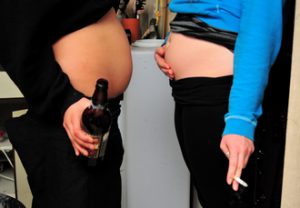SCOTUS Allows Wisconsin Fetal Protection Law to Continue
The line between the rights of an unborn fetus and the rights of the woman pregnant with that fetus is one of the most contentious legal issues in modern society. While it generally comes up in the context of a women’s right to choose to have an abortion, the same battle is fought on other fronts as well. In Wisconsin, one such situation dealt with the state’s ability to step in and take physical custody of a pregnant woman-force her to stay in a secure medical facility or prison-where she uses alcohol or drugs while pregnant.
Just a few months back, a Wisconsin District Court ruled that a 1997 law giving the state this power was unconstitutionally vague. This led to the case being appealed to the Supreme Court of the United States. Last week, the Supreme Court issued an order removing the Wisconsin District Court’s stay on the law-at least until the Supreme Court rules on the “fetal protection” law one way or another.
At this point, there is no final say on what will happen to Wisconsin’s law. However, to get a better idea of what the future of this law means for you let’s look at the law itself, the facts behind this case, and the ruling of the district court from a few months ago.
 The “Fetal Protection” Law and It’s History
The “Fetal Protection” Law and It’s History
Back in 1997, the Wisconsin Supreme Court made a ruling limiting the breadth of the Wisconsin Children’s Code-the code of laws allowing Wisconsin’s Department of Children and Families and other social services to take protective action in the interests of abused or neglected children. They determined that code did not give Wisconsin services jurisdiction over an adult pregnant woman just by reason that she is expecting.
But that same year they passed Wisconsin Act 292. The Act allowed juvenile courts and protective services to exert jurisdiction over an unborn fetus as if they were a child in need of protective services where the “expectant mother’s habitual lack of self-control in the use of alcohol beverages, controlled substances or controlled substance analogs, exhibited to a severe degree, [poses] a substantial risk” of harm to the unborn child. So, Wisconsin Services can hold pregnant women in custody if there is probable cause to believe she is within the jurisdiction granted by this act and there is reason to believe the mother is or has refused alcohol or drug services offered to her or isn’t making a good faith effort to participate in such services. The state can also appoint a guardian ad litem for the fetus-basically somebody who’s job is to advocate for the best interests of the unborn fetus.
On its face, this law seems innocuous. Abusing alcohol or drugs can have a serious effect on the health of a child when it is born. The ability of the state to step in and make women seek medical help in ceasing their alcohol or drug abuse could certainly prevent damage to a fetus that would ultimately affect the child for their entire life. However, but the Act was worded so vaguely that it opened the door for Wisconsin to potentially trample on women’s rights.
Ms. Tamara Loertcher’s Case
The case brought before the district court dealt with one Ms. Tamara Loertcher. She became pregnant in 2014 after long believing herself incapable of becoming pregnant. She was using methamphetamine and marijuana prior to becoming pregnant allegedly to self-medicate serious depression. Stating that she still did not believe she was truly pregnant, she went to the hospital three months later to confirm the results of her at-home test. The hospital’s tests revealed both pregnancy and drug use. She checked into a rehab clinic the same day.
Once at the rehab clinic, staff at the clinic reported Ms. Loertcher to child protective services for her drug use. This led to a case against her which culminated in her being unrepresented at regarding her being taken into custody. With no one there supporting her interests, she lost the hearing and was required to stay at a secure medical facility. She refused, was held in contempt, and thrown in jail with no medical services for 30 days. 18 days after being put in jail, she was released. She has since ceased all drug use and given birth to a completely healthy baby boy.
Ultimately, Ms. Loertscher stated that she felt that her worst mistake was going to the hospital in the first place. This is the fear of laws like Wisconsin’s, that they serve to deter the women who most need medical services from seeking help. However, this was not the reason the law was struck down.
The District Court’s Vagueness Ruling
In their ruling from the end of April of this year, it was the vagueness of the statute that led to the district court ruling it unconstitutional. A statute is unconstitutionally vague where it doesn’t give the public fair notice as to the exact boundaries of the law. It’s only fair that the public know when they are and when they aren’t violating the law. To pass muster, a law needs to give at least some guidelines for how it is enforced. This act was subjected to a high level of vagueness scrutiny due to the constitutional rights implicated by the acts potential to lead to either physical restraint or forced medical care.
When looking at the text of the statute, the found that many of its terms failed to rise to this simple standard. The act applies where there is habitual lack of self control when it comes to drug or alcohol use. However, how much is habitual? Daily? Multiple times a week? Multiple times a month? Experts in the case couldn’t really nail down what was habitual use, never mind that habitual use is likely different depending on what is being used.
Similarly, the act applies to severe lack of self-control when it comes to drugs or alcohol but provides no line whatsoever as to what is severe. Further, due to wording of “habitual lack of self-control,” the act could be applied to any woman who once had an alcohol or drug habit-even if she no longer uses any substance-because habitual deals with both past and present behavior.
The court raised one more rather odd concern. How would the act deal with a pregnant woman who simply didn’t believe that using drugs or alcohol would affect her fetus? This wouldn’t be a case of lack of self-control but rather a matter of misinformation.
The list of overly vague terms and unclarified ambiguities in the act went on: risk is included but how much risk is “substantial?” When will a child be seriously affected by drug or alcohol use? Studies tend to agree that such behavior can affect a pregnancy but the amount necessary to harm a fetus varies from study to study. The experts in the case certainly couldn’t present a scientific consensus as to any of these questions. Thus, the district court ruled the act unconstitutional for vagueness and issued an injunction preventing application of the law-the injunction the Supreme Court just lifted.
 The Future of the Act
The Future of the Act
The Supreme Court’s ruling only lets Wisconsin’s act continue functioning for now, it doesn’t necessarily mean that the Supreme Court will ultimately rule that the act is constitutional. It may tilt the odds in that direction. However, it is not the last nail in the coffin.
These sort of laws, allowing the government control over a pregnant woman because of her pregnancy, are certainly problematic. Abortion laws have long struggled in establishing the proper balance in the push and pull between a woman’s right to bodily autonomy and the rights of a developing fetus. Should a fetus be treated as having rights superseding that of the mother? When should a fetus be considered to have rights at all? With a law like Wisconsin’s, it seems like it allows the state to invade the rights of a pregnant woman almost immediately.
Drug and alcohol use during pregnancy is certainly not something to be encouraged. However, how far are we willing to allow the government to step on a woman’s rights to achieve this end? There is likely a middle ground here where the proper legal standard should be, however we continue to struggle to find the right way to deal with these issues. When the Supreme Court fully addresses this case, it will be the first time new appointee Justice Gorsuch will weigh in on such an issue since he joined the Court. We’ll have to wait and see what the Court’s eventual ruling will mean for Wisconsin’s law and women’s rights in general.

Comments
NEED HELP ASAP. My son, 20 years old and his fiance have had a very bad falling out. She is 19 and supposed to be due in July 2018. But now her mom from CA has decided to have Tayller ,M Palmer , leave the state of Wis after tons of health issues, leaving tons of unpaid medical bills and unpaid damages to my home. Along with very emotional issues to all of us. How do we get the right to see and be a part of our son’s child.